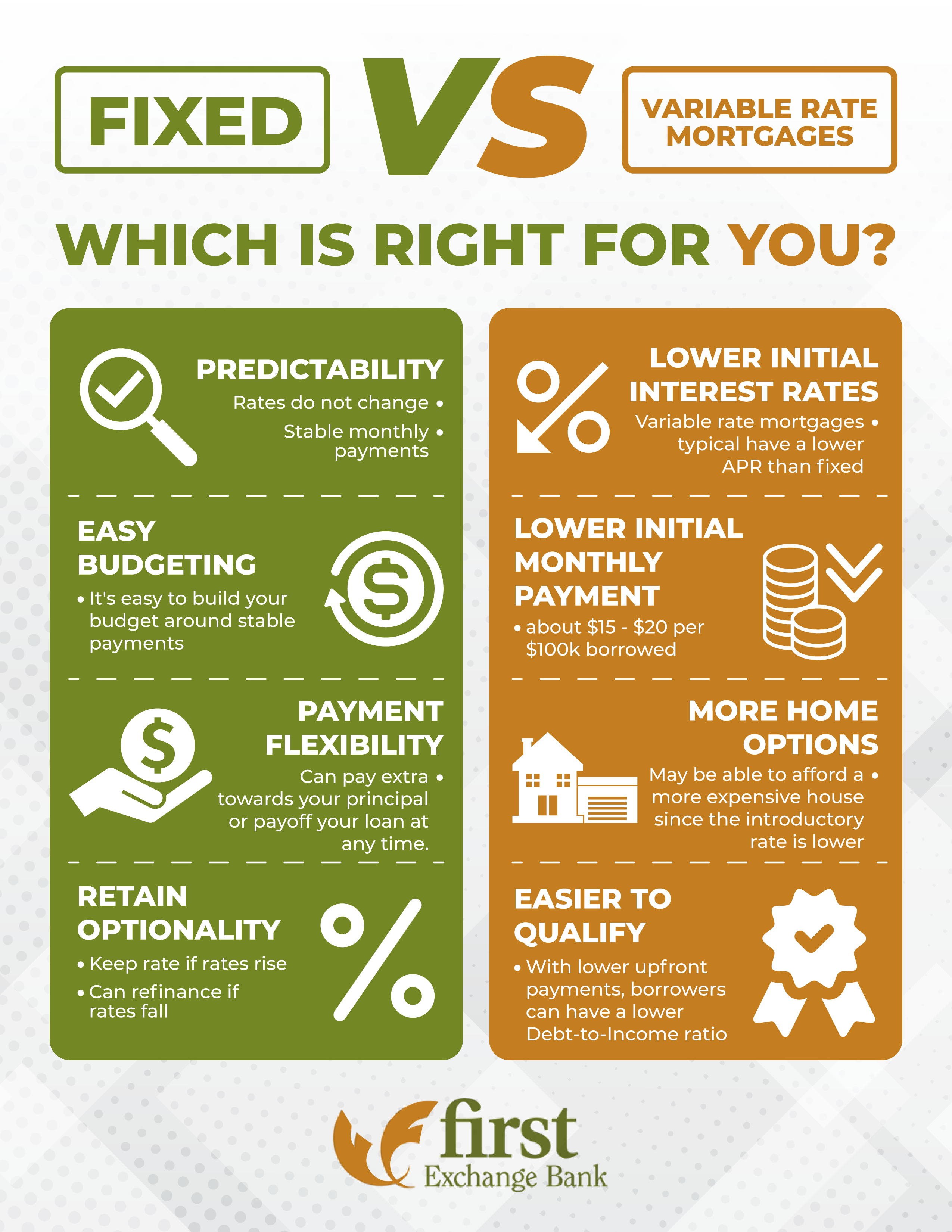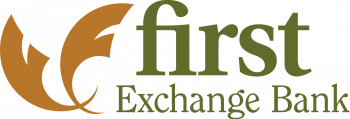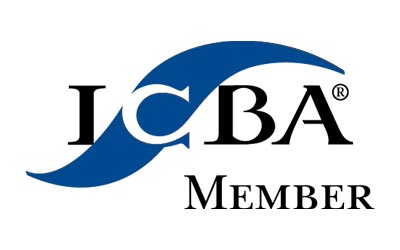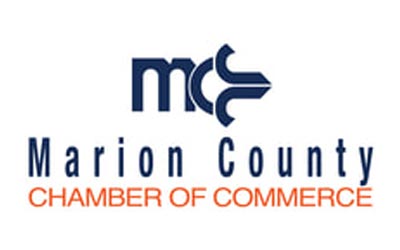How To Choose Between a Variable and Fixed Rate
If you’re buying a home in California, you may want to apply for a mortgage now. But which mortgage type should you choose? Learn more about the differences between a variable and fixed-rate mortgage.
Are you planning to buy your first or next home in California or considering the purchase of your second home in the mountains, or at the lake or the beach? You may have heard that real estate is “hot” right now and interest rates are “historically low.” But what does that mean for you? In this article, we’ll cover the two main types of mortgage loans: variable vs. fixed rate mortgages. Keep reading to learn the definitions of each, pros and cons, and the best scenarios for each option.
What is a variable-rate mortgage?
Also known as an adjustable-rate mortgage (ARM), this type of home loan does not have a fixed interest rate. However, there is usually an introductory period of several years in which the rate is fixed, and your monthly mortgage payment remains the same. After that, the interest rate adjusts according to the index rate it is tied to. Your loan terms will specify how often the rate is adjusted, such as every three years, and any limits on how high it can go. There is also a possibility of your rate adjusting down—it can follow the index in either direction.
Pros:
- Usually comes with a fixed-rate introductory period
- Great if you only plan to keep the house for the short-term, so you could end up selling it before the fixed-rate period ends.
- Generally, the initial rate will adjust in several years. First Exchange Bank offers an ARM that initially adjusts in seven years and every three years thereafter. Allowing you to easily plan ahead and budget for your mortgage payment.
- Rate adjusts up or down depending on the index it is tied to, which means your mortgage payment could potentially decrease.
- May be able to afford a more expensive house since the introductory rate is usually lower than a conventional, fixed-rate mortgage.
- At First Exchange bank your down payment can be less than 20% without purchasing private mortgage insurance (PMI) since we generally maintain our loans in-house. You can obtain up to 89.99% financing without PMI at First Exchange Bank, reducing your monthly payment.
- It may be easier to qualify for an adjustable-rate mortgage.
Cons:
- Requires some planning before the interest rate starts to change. You may want to sell or refinance after the introductory fixed rate period ends.
- Your monthly mortgage payments can increase after the introductory period.
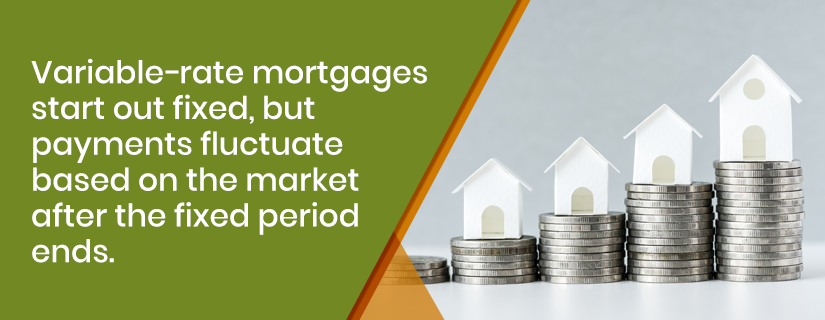
Have questions about variable-rate mortgages? Talk with a trusted mortgage lender to help you understand the terms and conditions of this type of mortgage and whether it’s right for you.
What is a fixed-rate mortgage?
Also known as a conventional mortgage, a fixed-rate home loan maintains the same interest rate through the life of the loan. This means that your monthly mortgage payment will stay the same as well.
Pros:
- Predictable, fixed interest rate so you know how much you will pay each month.
- Makes your budget more stable.
- Can pay off early with no prepayment penalty.
Cons:
- Higher monthly payments can make it more difficult to qualify for longer-term mortgages.
- There is no opportunity for your payment to decrease with the market.
- Choosing a fixed-rate mortgage means you’re interest rate will not change through the life of the loan unless you sell your home or refinance. So you could end up paying more in interest if the ARM index rates decrease.
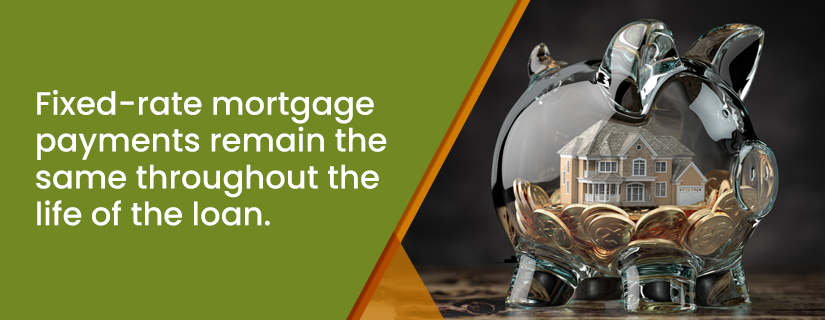
Have questions about fixed-rate mortgages? Talk with a trusted mortgage lender to understand this type of mortgage and whether it’s right for you.
When Does a Variable Rate Mortgage Work Best?
Now that you understand what a variable-rate mortgage is, you may be wondering if it’s the best option for you. Check out our list of the top reasons to choose a variable rate mortgage instead of a fixed rate mortgage:
- If you plan on selling your home before the introductory fixed-rate term expires.
- If you can pay off your loan before the end of the introductory fixed-rate period.
- If you are at the beginning of your career and/or expect your income to increase over time.
- If you expect lifestyles to change and you can envision selling your house as the size of your family changes.
- If you are a first-time home buyer and can afford “more house” with an ARM loan
- If you have a higher risk tolerance and can accept a varying rate.
- If you leave enough room in your budget so that you can comfortably accommodate a higher interest rate, should it adjust up.
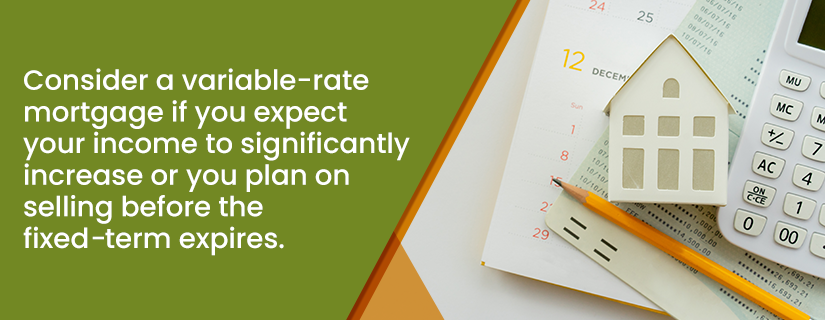
When Does a Fixed Rate Mortgage Work Best?
Still unsure if a variable or fixed rate mortgage is right for you? Check out our list of the top reasons to get a fixed-rate mortgage:
- Interest rates are historically low, and you want to lock in the low rate.
- You plan to stay in your home long-term.
- You value stability and predictability with your monthly mortgage payment.
- You prefer to avoid the risk of a rate increase.
- You can still save money on interest by choosing a lower term, such as a 15-year fixed mortgage instead of 20 or 30.
Learn more about variable or fixed-rate mortgage loans from First Exchange Bank!
Sill trying to decide whether a variable for fixed rate mortgage is right for you Our friendly and experienced mortgage lenders are here to help? At First Exchange Bank, we keep the process as simple as possible and provide personalized service from beginning to end. Our mortgage loan officers live and work in the same communities as you do, and we use our local expertise to help you find the best home loan to meet your needs. We make quick and local decisions and keep our loans in house, and we can offer up to 89.99% financing without requiring PMI plus we have lower closing costs than most banks!

Contact us, reach out to one of our knowledgeable mortgage loan officers, or apply online today! You can also visit us at any of our convenient locations in Morgantown, Mannington, White Hall, Hundred, Fairmont, or Fairview.
